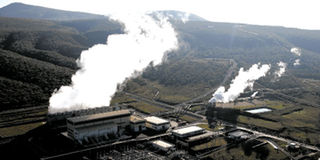Kenya drafts policy on carbon trading

PHOTO | FILE In Kenya, only seven projects are registered for carbon credit trading.
What you need to know:
- Guidelines in the pipeline to help government harness potential revenue from savings on emissions by green projects
- According to the chief economist at the Treasury, Mr Erastus Wahome, the draft National Policy on Carbon Finance and Emissions Trading is expected to be passed into law before the General Election
- Data from the Ministry of Finance shows that only seven projects are currently registered for carbon credit trading in Kenya
The Ministry of Finance is developing a policy on carbon trading to enable the government to harness potential revenue from projects that cut greenhouse gas emissions.
According to the chief economist at the Treasury, Mr Erastus Wahome, the draft National Policy on Carbon Finance and Emissions Trading is expected to be passed into law before the General Election.
The move, he said, will pave the way for the government to plan incentives to the private sector and encourage investors to engage in green projects. (Read: Carbon trading promises huge payoff for firms)
It will also facilitate resource mobilisation by attracting foreign investments into such projects, allow sustainable growth by guaranteeing stable carbon revenues, and enhance the country’s capacity to adopt carbon finance instruments.
“At the moment, we do not have a policy to provide a regulatory framework for managing carbon trading activities. Thus, we are hopeful that once the draft policy becomes law, it will provide the necessary framework to enable the government to fully tap into the carbon market,” said Mr Wahome.
Carbon credit trading typically refers to the business of exchanging one’s reduction on emission of carbon dioxide in a particular project, referred to as carbon credits, for an income.
Locally, the practice is popular among major companies that can afford to set up large projects and carry out studies to establish the extent to which carbon emission has been reduced.
This data is used to register the projects in the global carbon credit market where multinational companies, mainly in Europe and the US, source for credits to purchase in order to compensate local firms for investing in green projects and also act as incentives for more similar projects.
According to Mr Wahome, many individual investors have lost this opportunity mainly due to mass ignorance on the process of carbon credit trading as well inadequate capital to set up and register projects for this purpose.
“Clean mechanism development costs are high and given the lack of access to capital by individuals as well as general lack of information, carbon credit trading has mainly been dominated by companies rather than individual investors,” said Mr Wahome.
Data from the Ministry of Finance shows that only seven projects are currently registered for carbon credit trading in Kenya.
They include a 35-megawatt electricity co-generation project by Mumias Sugar Company, the Olkaria II and III Phase 2 geothermal development projects, the yet-to-be-constructed Lake Turkana Wind Power project, and the Mount Kenya Small Scale Reforestation initiative.
Others are the redevelopment of the Lake Turkana hydropower station project and the Kirimara Kithithina rehabilitation project in the Aberdares.




